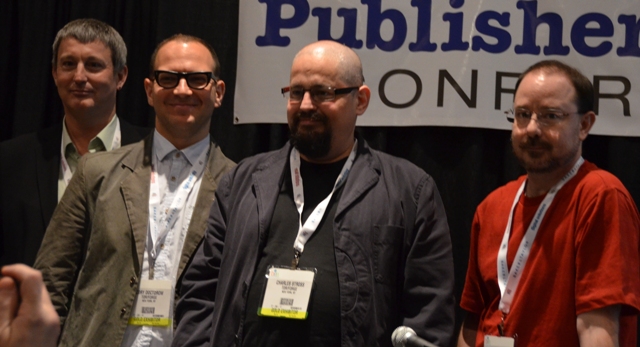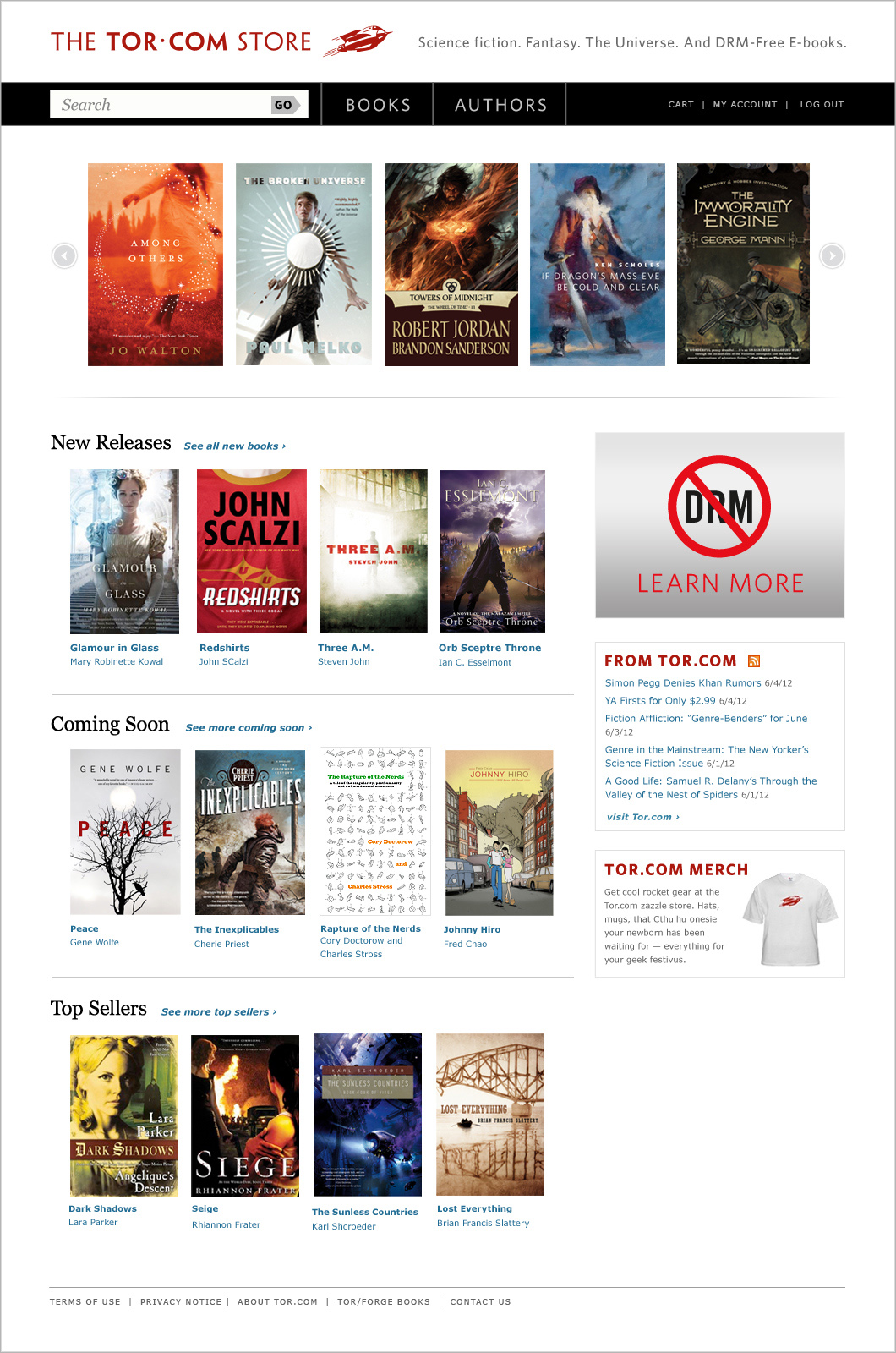Today at BookExpo America in New York City, Fritz Foy, Macmillan EVP Digital Publishing and Technology, discussed the recent decision to sell the full catalog of Tor e-book titles DRM-free, along with three surprise guest speakers: science fiction authors Cory Doctorow, Charles Stross and John Scalzi. The group talked about why going DRM-free improves author/reader relationships, strengthens relationships between publishers and retailers, and does not encourage piracy. In addition, Foy officially announced that a new Tor/Forge DRM-free e-book store will debut here on Tor.com in late summer, 2012.
Titled “Taking the Plunge,” this special presentation at BEA’s Publisher’s Launch aimed to explain exactly why Tor/Forge “unexpectedly” announced the switch to a DRM-free model. As Fritz Foy pointed out, however, it wasn’t unexpected at all, but instead something Tor/Forge had been “grappling with for close to four years.”
Indeed, during the lead up to the launch of Tor.com itself back in 2008, DRM-free e-books were given away as part of a test title selection. Between February 2008 and Moon Landing Day (July 20th), Tor Books gave out 1.2 million DRM-free e-books. Foy related that people worried, behind the scenes, “What have we done? Will this hurt backlist sales?”
But based on what Tor learned about the science fiction and fantasy market, the opposite seems to be true. Since 2007, even excluding number one best-selling Tor author Brandon Sanderson, sales of total units sold (including physical books) actually increased overall. Fears about online piracy simply did not pan out: the books in question continued to sell just as well as before, if not better. This indicates that keeping e-books in DRM formats does not prevent piracy on its own, a publisher still needs an enforcement program. Furthermore, DRM does not allow for a positive consumer experience, nor does it help readers communicate with authors. Finally, it appears that DRM does not encourage a healthy and competitive retail environment. If Tor gave out all these DRM free e-books, and saw sales increase, then clearly DRM is not a tool to help sell books.

In between Foy’s presentation about the big numbers involved, Cory Doctorow, Charles Stross, and John Scalzi all added their perspectives as science fiction authors.
“Copyright is weird,” Cory Doctorow opined. His analysis of the history of copyright focused on how books predate the concept and are often wrapped up with “candy bars, and blockbuster films.” But Doctorow thinks books are different because, “people of the book. We evolved with books right alongside dogs. And just as we share a visceral revulsion at the thought of eating a
dog, we are all distressed at the thought of destroying a book.” Doctorow feels that wrapping books up in DRM reduces them to only items of commerce and nothing more. He further reiterated the notion that having a DRM business model doesn’t really prevent copying, because there are always ways around said copying. Instead, DRM only serves to prevent healthy competition.
After Doctorow, Charles Stross spoke about why dropping DRM or “software snake oil” is good from a business perspective. Perceptively, Stross pointed out that “This is at the heart of customer resentment against DRM: once you buy a hardback you are free to do whatever you like with it — read it, lend it, or sell it on…but…DRM e-Books don’t work like that.” Going DRM-free changes this business perspective and makes e-books more similar to their physical counterparts. Stross concedes that this will have little impact on big bestellers, but will help boost sales for more genre-driven titles. “It will make it easier for smaller bookstores to sell e-books.” Science fiction plays a big part here for Stross because readers of genre fiction may be smaller in number but “buy a disproportionate amount of books.”
John Scalzi spoke about his belief that the removal of DRM from e-books improves his relationship with his readers directly because authors are so often on the front-line of questions about the formats of their e-books. Now, with the removal of DRM, Scalzi is in a better position with his readers than ever before: “Authors want to tell stories. That’s what we want to do. That’s what we were hired to do. The removal of DRM helps us interface with our readers better.”
All attendees of the launch received a free flash drive with DRM-free e-books included, announcing the launch of the Tor.com e-book store coming later this summer. As previously announced, Tor Books expects to offer all of their books DRM-free through all retailers by the end of the July. It seems only fitting that a publisher of science fiction and fantasy would be leading the way towards the future of publishing.










